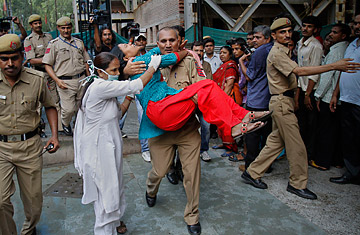
A nurse tries to assist as a policeman carries a woman who was injured by a blast outside the High Court in New Delhi toward a hospital for treatment on Sept. 7, 2011
Pakistan is under the spotlight again for hosting Islamist militant groups who export terrorism in the region. On Wednesday, Sept. 7, Indian media reported that Harakat ul-Jihad Islami (HUJI) had claimed responsibility for a bomb attack in New Delhi in which at least 11 people were killed. If the claim proves true, there is a danger of tensions escalating between nuclear-armed rivals India and Pakistan, less than three years after the two were pulled back from the brink of hostilities after the November 2008 Mumbai massacre.
Like Lashkar-e-Taiba (LeT), the group blamed for the Mumbai massacre, HUJI began life with the support of Pakistan's controversial Inter-Services Intelligence (ISI) agency. HUJI emerged during the anti-Soviet Afghan jihad. Later, the group switched its focus to fighting India as part of Pakistan's covert proxy war in Kashmir during the 1990s.
Unlike LeT, however, HUJI long ago severed links to the Pakistani security establishment. According to a senior Pakistani military official, some elements of LeT remain friendly to Pakistan, other elements are not, and a third group within the organization is said to be openly hostile. By contrast, HUJI and its splinter groups are seen as having long turned against the Pakistani state.
Some Pakistani analysts are skeptical of the claims of HUJI's involvement in the New Delhi attack. "I don't think it was HUJI," says Muhammad Amir Rana, an expert on Pakistani militant groups and the director of the Pakistan Institute for Peace Studies. "HUJI isn't functional anymore. It may be that an Islamist group has carried out this attack and is using HUJI's name as a cover."
If it emerges that HUJI, its reorganized remnants or other Pakistani Islamist groups were involved in Wednesday's New Delhi bombing, the revelation is likely to hurt Pakistan-India relations just as the two sides had begun to talk again. Two months ago, senior Pakistani officials traveled to New Delhi to sign a series of substantial trade agreements. Depending on who is responsible for the deaths in the Indian capital and how the two countries then react, those hard-earned but tentative gains could be easily wiped away.
Opinion seems to be divided over HUJI's capabilities and enduring relevance. In 2010, the U.S. State Department designated the group as a "foreign terrorist organization." It has been linked by the U.S. to terrorism in Indian cities, including a May 2007 attack on a mosque in Hyderabad and a March 2006 attack in Varanasi.
But Pakistani security analysts believe the group has ceased to function coherently for the past five years. "It hasn't been functioning in Pakistan, India or Bangladesh," says Rana. The group sank into obscurity, he says, after the Bangladeshi government carried out a crackdown on the HUJI franchise there. Bangladeshi militants, trained by Pakistanis and with experience in the wars in Afghanistan, had returned to their country to mount attacks inside India.
There is also a dispute over the role of Ilyas Kashmiri, the al-Qaeda commander who is said to have been slain by a CIA-operated drone strike in South Waziristan in June. Kashmiri was a prominent HUJI leader who switched his focus from Kashmir back to Pakistan's western border in recent years, moving to the tribal belt, where he orchestrated vicious terrorist attacks.
Rana believes HUJI leaders and militants have abandoned the group and, like Kashmiri, drifted into the embrace of either al-Qaeda or the Pakistani Taliban. In his apparently final years, Kashmiri operated as the head of the 313 Brigade, an al-Qaeda-affiliated group suspected of being behind two of the most spectacular attacks on Pakistani military installations. In 2009, there was a 24-hour siege of the army's headquarters in Rawalpindi. And in May this year, there was a 15-hour siege of a Pakistani naval base in Karachi. Kashmiri and his group's anti-Indian ambitions were reported by Saleem Shahzad, the only journalist to have interviewed the shadowy leader. Shahzad was tortured and killed in late May, just two days after writing about Kashmiri's involvement in the attack on the Karachi naval base.
According to Shahzad, Kashmiri sent the reporter a message in February 2010 suggesting the 313 Brigade was involved in the bombing of a German factory in Pune. In Shahzad's book Inside al-Qaeda and the Taliban: Beyond bin Laden and 9/11, the reporter alleged that Kashmiri confided to him that "Mumbai was nothing compared with what has already been planned for India in the future." Kashmiri's plan, Shahzad wrote, was to provoke hostilities between Pakistan and India, thereby easing pressure on militants to realize their ambitions in Afghanistan. The veracity of some of Shahzad's reports has been widely challenged.
Meanwhile, Pakistan itself continues to suffer from militancy. On Wednesday, just hours after the news of the New Delhi bombing, an incident claimed the life of a senior Pakistani army officer's wife and 22 others in the southwestern city of Quetta. In the attack, claimed by the Pakistani Taliban, a car exploded near a brigadier's home before a suicide bomber hurled grenades and blew himself up.
It is suspected that the bombings were revenge for the announcement of the capture of senior al-Qaeda operative Younis al-Mauritani and two others in the city. In a sign that the U.S. and Pakistan have resumed cooperation after months of bitter brinkmanship, the Pakistani army triumphantly announced that al-Mauritani was captured with key support from the CIA. The high-profile arrest signals a rare easing of relations after the U.S. covert raid that killed Osama bin Laden in May.
